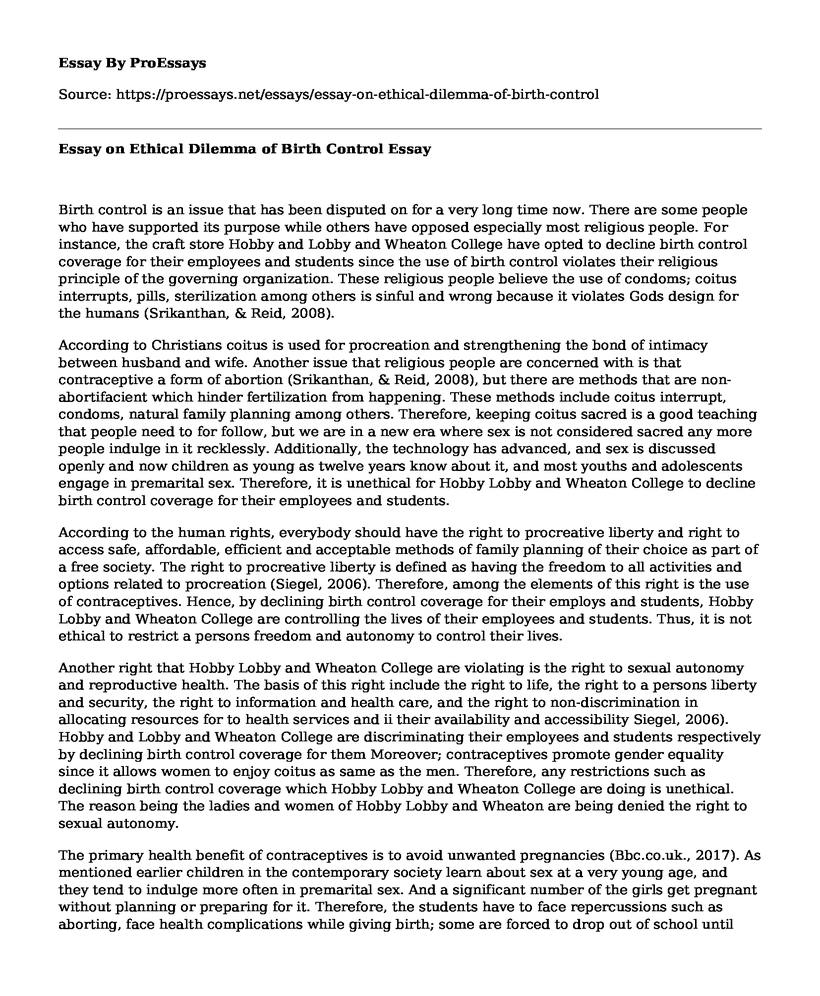Birth control is an issue that has been disputed on for a very long time now. There are some people who have supported its purpose while others have opposed especially most religious people. For instance, the craft store Hobby and Lobby and Wheaton College have opted to decline birth control coverage for their employees and students since the use of birth control violates their religious principle of the governing organization. These religious people believe the use of condoms; coitus interrupts, pills, sterilization among others is sinful and wrong because it violates Gods design for the humans (Srikanthan, & Reid, 2008).
According to Christians coitus is used for procreation and strengthening the bond of intimacy between husband and wife. Another issue that religious people are concerned with is that contraceptive a form of abortion (Srikanthan, & Reid, 2008), but there are methods that are non-abortifacient which hinder fertilization from happening. These methods include coitus interrupt, condoms, natural family planning among others. Therefore, keeping coitus sacred is a good teaching that people need to for follow, but we are in a new era where sex is not considered sacred any more people indulge in it recklessly. Additionally, the technology has advanced, and sex is discussed openly and now children as young as twelve years know about it, and most youths and adolescents engage in premarital sex. Therefore, it is unethical for Hobby Lobby and Wheaton College to decline birth control coverage for their employees and students.
According to the human rights, everybody should have the right to procreative liberty and right to access safe, affordable, efficient and acceptable methods of family planning of their choice as part of a free society. The right to procreative liberty is defined as having the freedom to all activities and options related to procreation (Siegel, 2006). Therefore, among the elements of this right is the use of contraceptives. Hence, by declining birth control coverage for their employs and students, Hobby Lobby and Wheaton College are controlling the lives of their employees and students. Thus, it is not ethical to restrict a persons freedom and autonomy to control their lives.
Another right that Hobby Lobby and Wheaton College are violating is the right to sexual autonomy and reproductive health. The basis of this right include the right to life, the right to a persons liberty and security, the right to information and health care, and the right to non-discrimination in allocating resources for to health services and ii their availability and accessibility Siegel, 2006). Hobby and Lobby and Wheaton College are discriminating their employees and students respectively by declining birth control coverage for them Moreover; contraceptives promote gender equality since it allows women to enjoy coitus as same as the men. Therefore, any restrictions such as declining birth control coverage which Hobby Lobby and Wheaton College are doing is unethical. The reason being the ladies and women of Hobby Lobby and Wheaton are being denied the right to sexual autonomy.
The primary health benefit of contraceptives is to avoid unwanted pregnancies (Bbc.co.uk., 2017). As mentioned earlier children in the contemporary society learn about sex at a very young age, and they tend to indulge more often in premarital sex. And a significant number of the girls get pregnant without planning or preparing for it. Therefore, the students have to face repercussions such as aborting, face health complications while giving birth; some are forced to drop out of school until they give birth and most do not go back to school after that since they have to take care of the baby because they cannot afford a nanny. Therefore, declining birth control coverage is unethical since students in Wheaton college who get pregnant will have to leave a miserable life with their dreams stuttered. Hence, it is better we prevent such issues from happening, and it is good to emphasize on non-abortifacients contraceptives.
Contraceptives provide people with the choice of the number of kids they want to have, and this is mostly by looking at the financial status of a couple (Bbc.co.uk., 2017). Being financially capable is paramount when raising children since they are expensive they need a better basic needs such food, shelter, clothing, and education for their development. Lack of birth control can lead to giving birth to a lot of children whom a person cannot support due to limited finances. At some point, the children can be taken away from their parents and taken to foster homes which are a great challenge for the parents and the children. Also, most parents will have a lot of pressure to ensure ends meet even if it means taking more than two jobs a day. This is a challenge because they will not have enough time for their children because most of the time they will come home tired and will want to rest. Therefore, Hobby Lobby should try to avoid this and support birth control for their employees.
References
BBC - Ethics - Contraception: Moral case for contraception. (2017). Bbc.co.uk. Retrieved 13 June 2017, from http://www.bbc.co.uk/ethics/contraception/in_favour.shtml
Siegel, R. B. (2006). Sex equality arguments for reproductive rights: their critical basis and evolving constitutional expression. Emory LJ, 56, 815.
Srikanthan, A., & Reid, R. L. (2008). Religious and cultural influences on contraception. Journal of obstetrics and gynecology Canada, 30(2), 129-137.
Cite this page
Essay on Ethical Dilemma of Birth Control. (2021, Jun 28). Retrieved from https://proessays.net/essays/essay-on-ethical-dilemma-of-birth-control
If you are the original author of this essay and no longer wish to have it published on the ProEssays website, please click below to request its removal:
- Essay Sample on Autonomous Vehicles and Ethical Implications
- William Penn's Quakerism and Religious Tolerance Beliefs Essay
- The Case Study of an Ethical Dilemma
- Literary Analysis Essay on Faithless
- Essay Sample on In the Looking Glass: The Impact of the Internet on Society
- Paper Example on Enhancing Interpersonal and Communication Skills: My Work History
- Religious and Spiritual Development in Childhood - Paper Example







